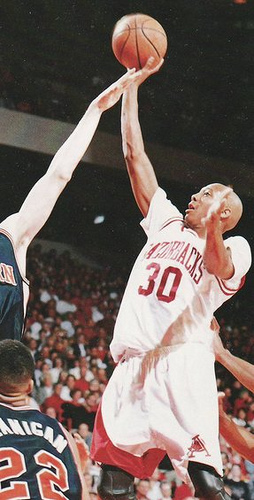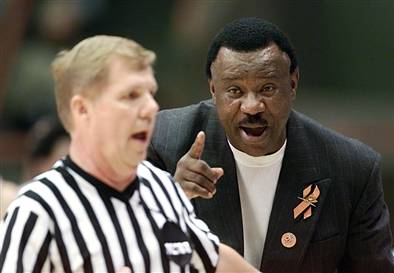Today, we present the penultimate installment of our Q&A with Razorback great Scotty Thurman, conducted in late September (here's part 1, part 2 and part 3). Below, Scotty discusses the difficulties of trying to repeat as national championships, the extent to which the defeat to UCLA in the '95 title game lingers and his take on Nolan Richardson's firing.

Our next question is about the season after the national championship. It seemed like it was a more difficult season. You lost more games, and you had a lot more close games. Was that mainly because teams were more up for playing you guys, or do you feel like the team experienced any loss of focus or enthusiasm as kind of a natural coming-down effect after winning the championship?
I think it was a combination of a couple of things. One of the things was, like you said, we were getting teams’ best shot every night. You can’t really prepare for that, because they have an edge that you don’t have any longer. Now, instead of hunting, being in the group of hunting the champ, now you’re being hunted. You just can’t prepare for that, really.
But, I think it was also having experienced the championship and being on an all-time high – and being on an all-time high for a long time. Because until you get beat, you’re still the champ. For 12 months, basically, you're having to deal with not only taking people’s best shot, but being a college athlete and having different people pulling at you because you’re the number one team in the country.
It’s probably only human nature for us to have gotten a little bit comfortable. I think we got somewhat comfortable.
That 1995 NCAA Tournament had so many memorable, crazy games. There was the game against Syracuse. There was the game against Memphis, where you mounted the comeback. Out of that tournament, which one of those games is the most special memory or the best memory to you?
The year the lost we championship, probably the most memorable game — it would probably be the Syracuse game. For the most part, we felt like we were the better team. We felt like we should be able to run them out of the gym, but they were able to sit back in a 2-3 zone all night and basically get us to play at their place. I think that slowed us down.
And then we finally get into a crazy, back-and-forth scoring match, and we're down one, and Lawrence Moten calls a time-out. Well, Lawrence Moten called a timeout because everybody on the bench was screaming, "Timeout!"
That was probably our most memorable because had the timeout never happened, we probably — would have for sure — lost the game. That gave us a break. But, the game before that against Texas Southern, if Dwight Stewart doesn’t go 7 for 10 from the three-point line, we lose that game.
We read an article recently in which Jay Bilas — the ESPN analyst whose 1986 Duke team made it to the championship game in 1986 against Louisville and lost — said that even now, he still thinks about that loss almost every single day. At this point, how often do you think about the game against UCLA, or the game against Duke?
Only when people talk about it. When it’s something that you do every day – you know, you play basketball every day – then people don’t have to talk about it because you’re actually living in it. But, when you’re a father and you get up and go to work every day and don’t play basketball for the most part except for fun, then you really don’t think about it that much.
Sometimes if I’m working out, I may think about it. If it’s March, I may, because of the tournament. But for the most part, I don’t really think about it. When I do think about it, I think about ways in the UCLA game that we could have won the game. I don’t really think about the overall game – I just think about some adjustments that we probably could have made to maybe have won the game. But, what can you do now?

What was your take on how Coach Richardson’s time in Fayetteville ended?
I think it was sad that you have two older gentleman that can’t actually sit in a room and actually talk it out and get it worked out, so that it never gets to that point. I just think it was pretty sad that it had to end that way. But at the same time, if put myself in Coach Richardson’s shoes, if any person gets frustrated with the way he’s being treated, no matter how much money he’s making or what type of status he has gained from being who he is, anybody can lose it. And I think he just kind of lost it.
But I also think, you know, at the same time, had he not made those comments on national TV, I think he probably still today would have been Arkansas’ basketball coach — if he and Frank had ever just sat down and talked it out as men, not as guys that don’t like one another but as men. They may not have liked one another at the end of the day, but college basketball is about business. It’s not about me liking somebody and not liking somebody. It’s about business.
The program probably never would have dropped off – although, I think Coach Richardson was kind of like us in a sense in that he got comfortable and that’s what led to those statements. You just can’t make those kind of statements and expect to not have to face the consequences.
Are you in touch with him today?
I don’t talk to Coach Richardson very much. I’ve seen him probably once in the last couple of years. I used to see him when he would come to Little Rock and play in different charity golf events, but no, I don't really see Coach much. He's normally in either northwest Arkansas or traveling home to El Paso, and I’m in Little Rock. Not that it’s far away, but the only time we seem to connect is when we’re involved in some kind of event or something.
In the final installment tomorrow, Scotty talks about what Coach Pelphrey needs to do to be successful at Arkansas.
